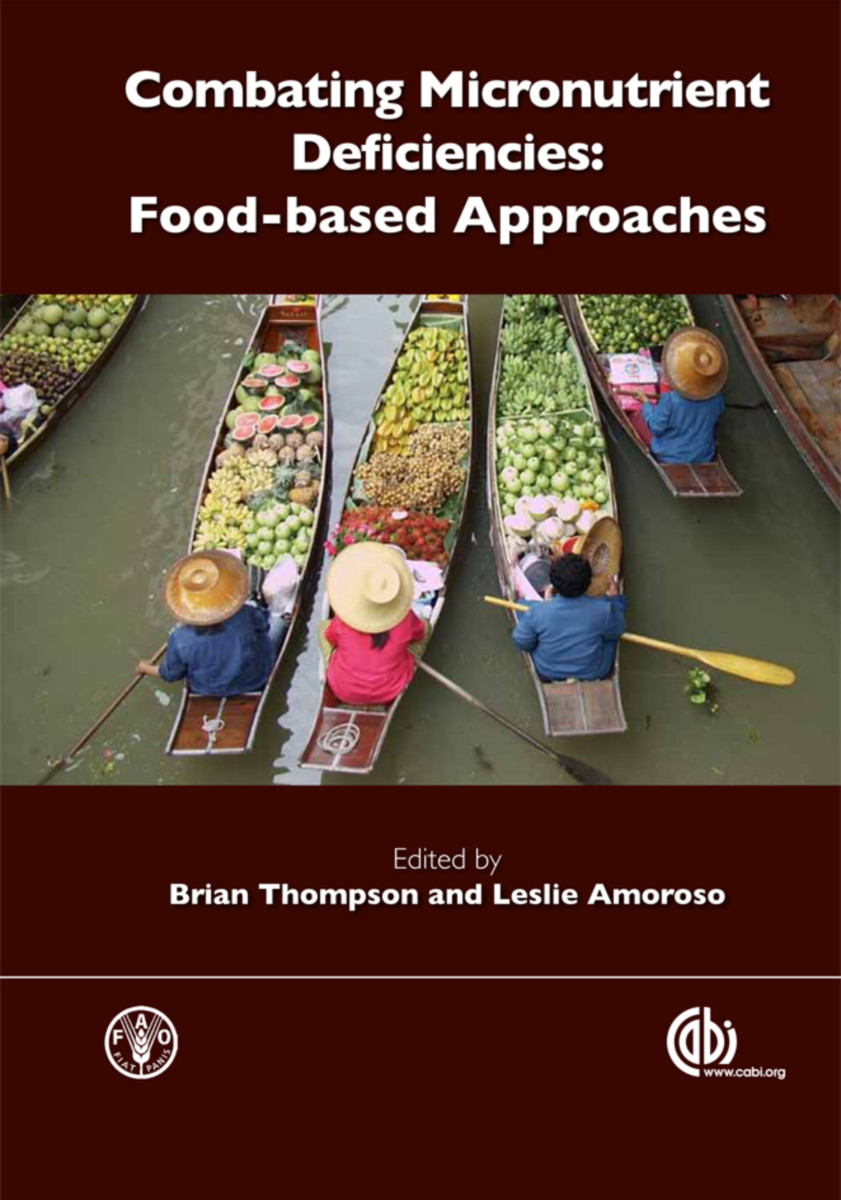Combating Micronutrient Deficiencies
Food-Based Approaches
- Publisher
CABI - Published
4th January 2011 - ISBN 9781845937140
- Language English
- Pages 430 pp.
- Size 6.875" x 9.75"
- Images illus
Micronutrient deficiency affects more than two billion people in the world today, contributing to the vicious cycle of malnutrition and underdevelopment. Micronutrient deficiencies have long-ranging effects on health, learning ability and productivity. Food-based approaches, which include food production, dietary diversification and food fortification, are sustainable strategies for improving the micronutrient status of populations. This book focuses on practical, sustainable actions for overcoming micronutrient deficiencies through increased access to, and consumption of, adequate quantities and an appropriate variety of safe, good-quality food.
Co-published with the Food and Agriculture Organization of the United Nations.
"More than two billion people suffer from a micronutrient deficiency of trace minerals and vitamins that has debilitating effects on their physical health, mental acuity, learning ability, and economic productivity. The 'cure' for a micronutrient deficiency is to be found in food production, dietary diversification, and food fortification. The global problem of micronutrient deficiencies is of serious concern to the Food and Agriculture Organization of the United Nations. Two of their staff, Brian Thompson and Leslie Amoroso, have collaborated to compile "Combating Micronutrient Deficiencies: Food-Based Approaches", a 256-page compendium of nineteen articles by experts in their fields, that has as its focus thematically appropriate, applicable, sustainable techniques, strategies, and practices to insure the production of safe, good-quality food as a means of successfully ameliorating micronutrient deficiencies anywhere in the world. Enhanced with bibliographic references and a comprehensive and exhaustive index, "Combating Micronutrient Deficiencies" is a significant and invaluable addition to professional and academic library Nutritional Studies reference collections."
- Midwest Book Review
1) Strategies for preventing multi-micronutrient deficiencies: a review of experiences with food-based approaches in developing countries
2) Addressing micronutrient malnutrition to achieve nutrition security
3) Agricultural interventions and nutrition: lessons from the past and new evidence
4) A 3 year cohort study to assess the impact of an integrated food- and livelihood-based model on undernutrition in rural western Kenya
5) Food-based, low-cost strategies to combat micronutrient deficiencies: evidence-based interventions in Lesotho and Malawi
6. Animal source foods as a food-based approach to address nutrient deficiencies and functional outcomes: a study among Kenyan schoolchildren
7) Small animal revolving funds: an innovative programming model to increase access to and consumption of animal source foods by rural households in Malawi
8) Aquaculture's role in improving food and nutrition security
9) A home gardening approach developed in South Africa to address Vitamin A deficiency
10) AVRDC - The World Vegetable Center's approach to alleviate malnutrition
11) Introducing vegetables into the India Mid-Day Meal Programme (MDM): the potential for dietary change
12) Developing micronutrient-rich snacks for pre-conception and antenatal health: the Mumbai Maternal Nutrition Project (MMNP)
13) Approaches and lessons learned for promoting dietary improvement in Pohnpei, Micronesia
14) A food systems approach to increase dietary zinc intake in Bangladesh based on an analysis of diet, rice production and processing
15) Combating iron deficiency: food-based approaches
16) Human micronutrient deficiencies: linkages with micronutrient deficiencies in soils, crops and animal nutrition
17) Nationwide supplementation of sodium selenate to commercial fertilizers. History and 20-year results from the Finnish selenium monitoring programme
18) Leaf concentrate and other benefits of leaf fractionation
19) Disability-Adjusted Life Years (DALYs): a methodology for conducting economic studies of food-based interventions such as biofortification
Brian Thompson
Brian Thompson , MSc in Human Nutrition, London School of Hygiene and Tropical Medicine, UK, is a nutritionist with over 30 years of international development experience. He is Senior Nutrition Officer in the Nutrition and Consumer Protection Division of FAO dealing with Nutrition Security and Policy. Working initially for ICRC, WFP and UNICEF with the NGO community in Asia over five years, he led nutrition surveys, provided clinical treatment, designed and evaluated emergency relief and recovery programs including feeding programs, supported health prevention and promotion activities and coordinated the provision of comprehensive humanitarian aid to refugees and other vulnerable communities. He joined FAO Headquarters in Rome in 1987 and advises Member Countries on the development and implementation of policies, strategies and plans of action for promoting and improving food and nutrition security in both emergency and development contexts.
Leslie Amoroso
Leslie Amoroso has a Masters in Urban and Regional Planning for Developing Countries with emphasis on food and nutrition security and livelihood issues from the Istituto Universitario di Architettura di Venezia (IUAV), Venice, Italy. She has extensive international experience in food and nutrition security policy and programme-related activities, with childhood, gender and HIV/AIDS components, in Ethiopia, The Gambia and Nicaragua. Since 2007, she has been working as a Nutrition Consultant in the Nutrition Security and Policy Group, Nutrition and Consumer Protection Division, FAO, where she provides advice and support to policy, strategy, capacity building, advocacy and programme activities aimed at improving food and nutrition security among vulnerable population groups. Ms. Amoroso also collaborates on several initiatives designed to strengthen linkages between food and nutrition security assessment and decision making at policy and program level.


